Humanities & Social Sciences
The Department of Journalism & Communication Launches two New Masters programs
Published
3 years agoon
By
Jane Anyango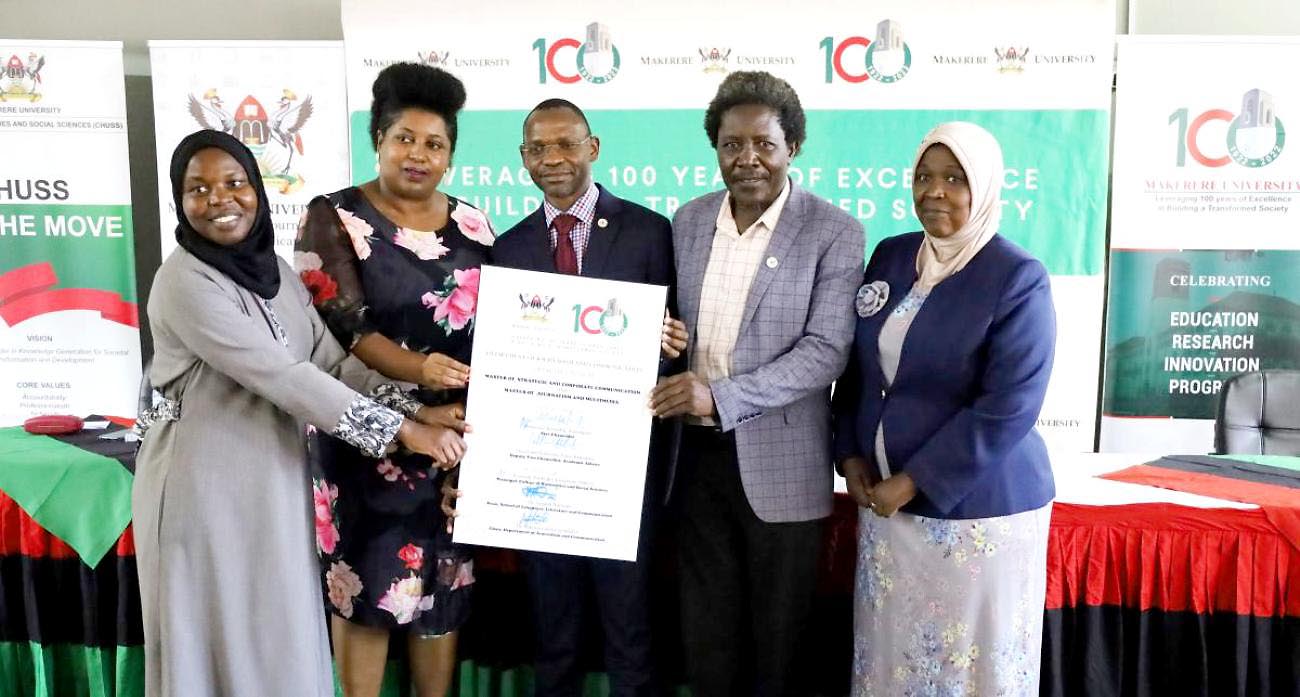
Makerere University’s Department of Journalism and Communication on Thursday 20th October 2022 launched the Master of Strategic and Corporate Communication and the Master of Journalism and Multimedia with a call on Management and Government to elevate the department to a school of Journalisms and Communication.
The department also reiterated the need for the university Management and government to support the department reposes the frequency for its training radio – the campus FM and to acquire equipment for practical teaching and learning.
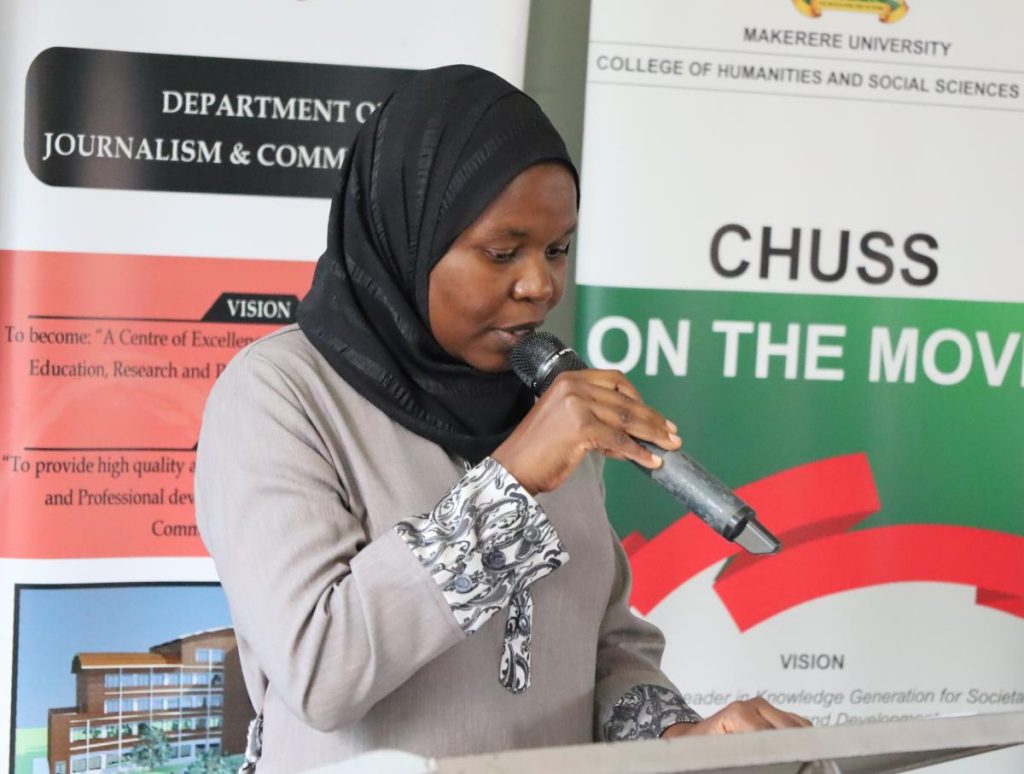
“We want to turn into a school of Journalism and Communication in the next five years. Management is helping us to revive the campus FM and we hope our efforts yield results in the near future. We want to start a multimedia studio, revive our radio, and start a television and a newspaper”. The Head of Department Dr. Aisha Nakiwala reported.
Recalling the evolution of the department from what she described as an endangered state, the Dean School of Languages, Literature and Communication Dr. Saudah Namyalo recognised the brains behind the establishment and growth of the department including Prof. Gorretti Nansanga and Dr. William Tayebwa.
Dr. Namyalo hailed staff for raising the name of the department to a level where it is recognised as the best department training journalists and communicators in the country and Africa.
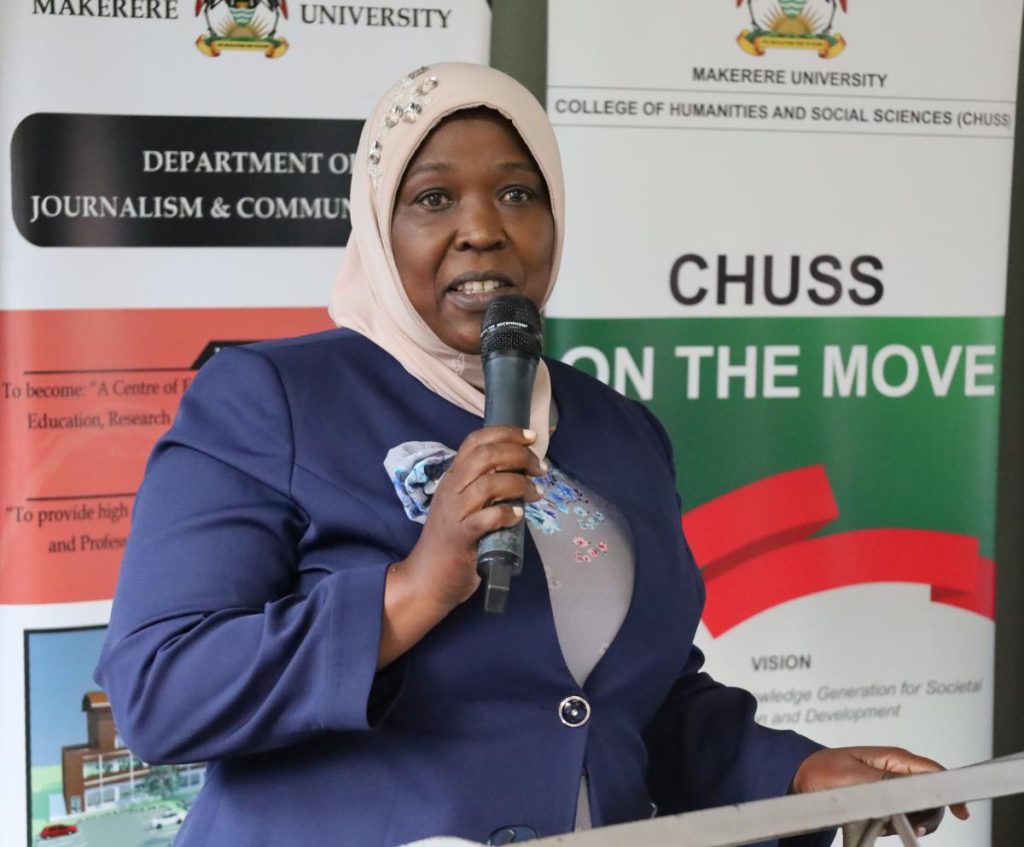
The Department currently has s 13 academic staff members holding PhDs and two in the pipeline. All these 13 PhD have gone through the hands of these people, similarly one of the long serving members of the department is Dr. Adolf Mbaine. The challenge now is to move from PhDs and work towards becoming professors”, Namyalo emphasised.
As bigger strategy to revolve into a research led school and department, Namyalo reported that the school was still a number of writing a number of graduate programs adding that already one a masters in French language and French studies had been launched while another in Germany studies was underway.
Launching the programs, at the Senate Telepresence Conference Room, the Deputy Vice Chancellor in Charge of Academic Affairs Assoc. Prof. Umar Kakumba hailed the department and all stakeholders for the laborious, rigorous and widely consultative process from the conception, development up to the final approval.
“Both programmes are timely in various ways. On one hand, they are an apt response to the critical need for practical skills in the market place where communication, as a crosscutting discipline, calls for specialized knowledge and abilities to support the functioning of any organisation or society.
On the part of the media, as we all know, the field has evolved from traditional journalism as we knew it, to one of cutting-age innovation. For today’s journalists to be worth their name and calling, they must embrace the new skills and tools very fast”.
Kakumba noted that the two Masters programmes find the university at the heels of the centennial celebrations and at the threshold of its transition towards a research-led institution.
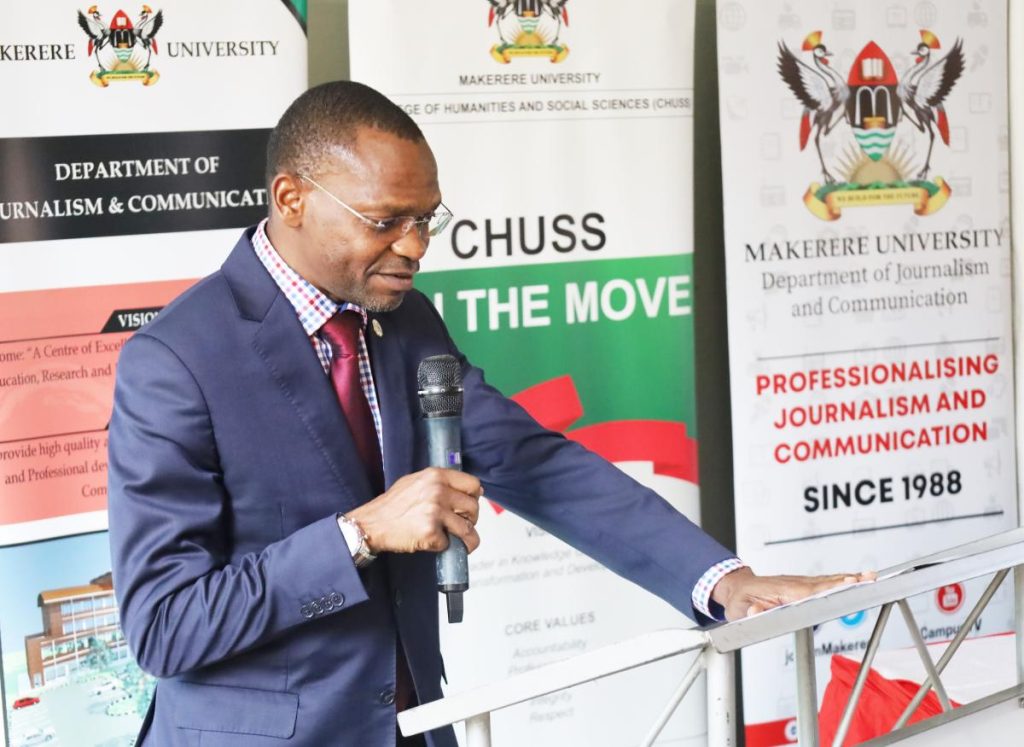
He commended the Department for leading in its field by not only equipping students with knowledge and practical skills, but also designing graduate programmes that include a rich research component aimed at building a community of highly trained researchers and professionals that can provide evidence based solutions to real problems in society.
“Our graduates from Makerere should be people that are sensitive to the needs in society, and who provide solutions. Strategic communication professionals, journalists, and the media are powerful resources for mobilizing the pubic and holding leaders at different levels accountable.
The Department of Journalism and Communication has provided leadership in this regard by arming students with tools that make them relevant in a rapidly changing media and communication environment, and a society that is desperate for transformative ideas and information”, Kakumba explained
Kakumba reassured the Department that management, will continue to support her growth so that, with adequate resources and clout as a unit, they continue to innovate and develop more programs that have a tangible positive impact on the industry and in society as a whole.
He said management had engaged the Minister for ICT and National Guidance Dr. Chris Baryomunsi on the restoration of the campus frequency adding that the minister had already directed the Uganda Communications Commission to expedite the process.
Importance of Strategic and Corporate Communication
While delivering the key note address, Alumnus Gloria Sebikali from the Uganda Petroleum Authority stressed the importance of strategic communication in translating community, societal and country’s aspirations to reality.
Strategic Communication according to her, must support the achievement of the organisation’s goals and the country’s development aspirations, address the challenges related to creating awareness in order to achieve sustainable development and the related global development issues.
It must focus on strategies to address the information gaps, misinformation, and disinformation. And it is important to link the classroom learning to present day practice, Use the alumni to enhance the curriculum as the programme is implemented.
Unlike the past, Sebikali observed, strategic communication is beginning to take center stage with ministries, private sector institutions and parastatals establishing independent and professional communication units benchmarked on other corporate entities.
“The communications function is increasingly part of management, and is gaining recognition as a strategic function. This makes the Masters programme in Strategic and Corporate Communication even more relevant.
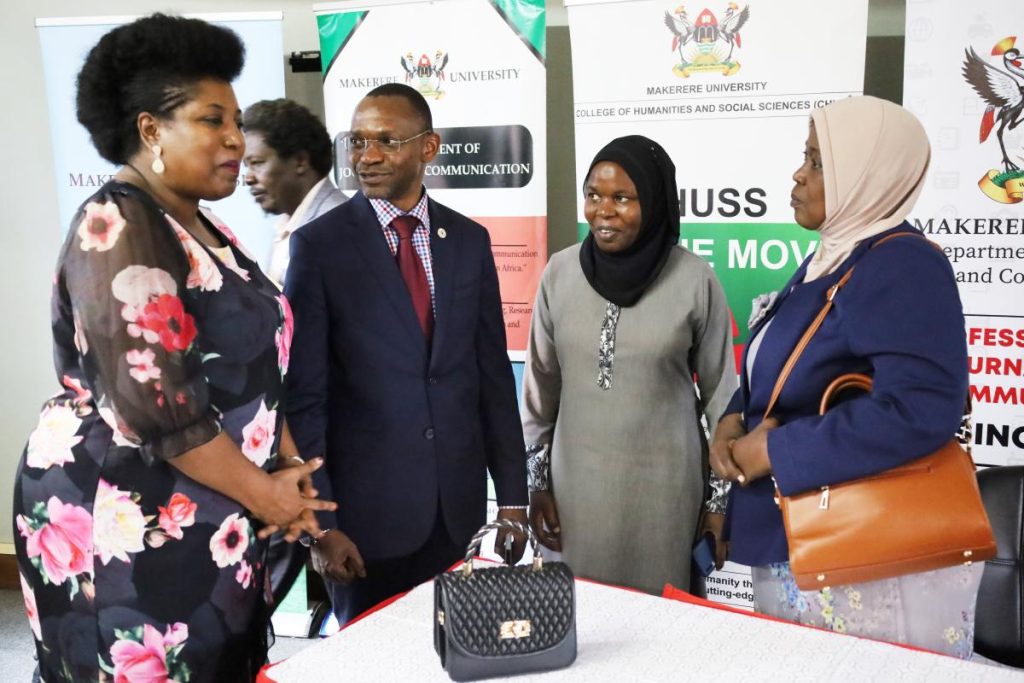
The programme must prepare and enable communication professionals to understand the role of strategic communication in achieving organisation objectives, and the overall development aspirations of the country”, She explained
Sebikali explained that with the rise in technological developments and the various new media platforms, strategic communication offers pathways for institutions to remain responsive to the changing needs of stakeholders, and the communication landscape.
“For instance, we no longer have to wait for the dailies to receive breaking news, or a report to hear about an incident on the community or the 8pm news to hear about what is happening.
She observed that the COVID 19 pandemic showed us the possibilities, and importance of technology in facilitating communication. Just think of how many webinars, e-conferences, and meetings you attended prior to the pandemic. Even with the lifting of the lock downs, live streaming and e-events continue to be the norm. Technology has, therefore, changed the communication landscape, and the profession must be even more dynamic in utilizing technology to achieve strategic communication”, She added
Strategic Communication according to Sebikali is a broad field which integrates different specializations in the communication arena, including marketing and advertising, brand management, media relations, public relations and stakeholder management, social responsibility, or corporate social investment.
Equally important is that it explores the capacity of all organizations – not only corporations, but also not-for-profit organizations (including advocacy and activist groups) and government—for engaging in focused communication while ensuring that communication is purposeful and contributes to the achievement of the organization’s mission.
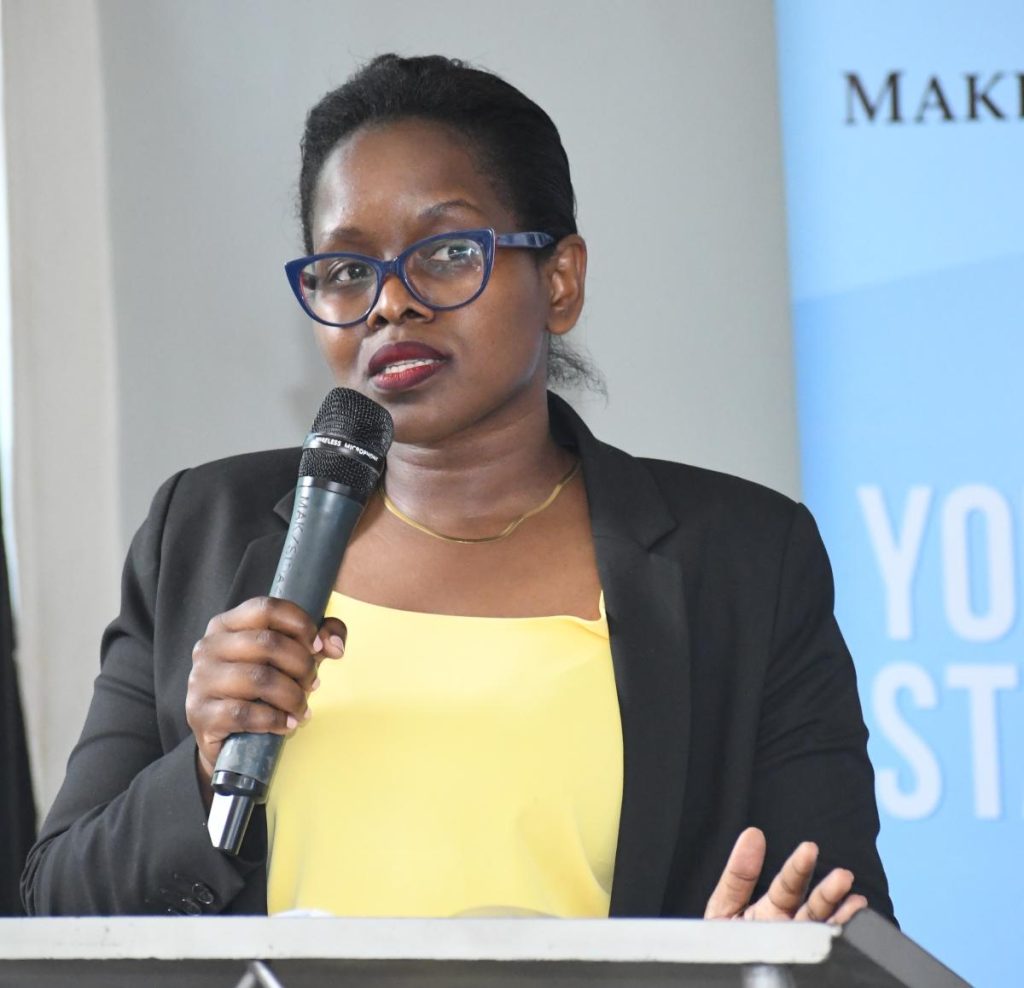
The MA in Strategic and Corporate Communication, Sebikali elaborated has a task of equipping the students with the knowledge and skills to further cement the value and place of communication as a strategic function within all institutions. We must strive to maintain our seat at the table, not only by demanding for it, but by showing the value of communication in achieving the organisation’s strategic goals and objectives.
She noted that the programme incorporates the different facets of strategic communications, with a mix of theory, research, practice, and multimedia approaches with the current trends related to global communication and health and environment communication covered.
“I want to also emphasize the importance of public diplomacy, as an added area for consideration. This course must equip the students with the required skills and knowledge that are in tune with the current issues, and technological developments.
We all know that the world is a global village. Therefore, for communication to be strategic, it must also be in tune with the current issues that the world is grappling with, many of which are summarised in the sustainable development goals”, Sebikali said.
Strategic communication Sebikali emphasised must address the challenges related to creating awareness in order to achieve sustainable development. It must also address the information gaps, the misinformation and disinformation.
Some of the issues she highlighted include the oil and gas sector, discussions related to climate change, the energy transition, environment and biodiversity protection, technological developments and social issues that are taking center stage.
Sebikali stated that it is important that the curriculum goes beyond building knowledge in the classroom, to giving the students practical skills to enhance their professional visibility. Accordingly, she explained, it is not enough to be equipped with knowledge, but be able to apply the knowledge to address communication challenges, and bring additional value.
In addition, she went ahead to state that the curriculum should also emphasize practical training and the current practice of strategic communication in different spheres and sectors. For Masters’ courses, whereas there is no space or time for internships, the faculty can encourage workplace mentors.
The Department of Journalism according to Sebikali was home to many professionals that are leading strategic communication in different entities, and can, therefore, be resourceful in linking the classroom learning to present day practice. Use the alumni to enhance the curriculum as you implement the programmes.
As the country advances to middle income status, strategic communication is required to translate the country’s development aspirations across all sectors and to all stakeholders. We therefore must play our role, and continue preparing both the current and next generation of communicators to be up to the task.
The Master of Arts in Strategic and Corporate Communication
The “Master of Arts in Strategic and Corporate Communication”, was be implemented this academic year 2022/2023. The programme is designed to develop academic knowledge as well as practical skills in the practice of strategic communication that includes public relations, corporate communication, integrated marketing communication, and development communication. The programme was conceived as a result of the ever-increasing demand for advanced training in the aforementioned areas of strategic communication.
Whereas the current approach to communication training at graduate level has tended to focus on journalism and media studies, there has been a growing demand for graduates who are competent in behavioural, social, and development communication aimed at addressing livelihood conditions at different levels of society. Such graduates would be better prepared to apply their communication skills and knowledge to support efforts to improve livelihoods in areas such as health, environment, agriculture, population, education, economics, human rights, and several others.
Similarly, the growth of the corporate and public sectors in Uganda and beyond, over the last decade, has brought communication at the forefront of business and public service delivery. Companies and organizations in the public, private and non-governmental sectors are investing more of their resources in a variety of strategic communication approaches as a means of promoting their values, marketing their products and services, engaging with their stakeholders and clients, engaging with communities through corporate social responsibility, and building as well as maintaining their public image.
In offering this programme, the Department recognizes that the many strategic communication approaches referred to herein – public relations, corporate communication, integrated marketing communication, media relations and development communication – draw from a related set of theoretical and conceptual premises. This programme therefore aims to integrate the teaching of the above areas of communication practice so as to better prepare students for work in this dynamic profession.
Upon completion of the programme, graduates will be employed in a variety of jobs in the wide scope of strategic and social change communication. More specifically, graduates who complete this programme will be ready to earn employment in jobs such as: communication policy consultant, communication manager, public relations director, communication researcher, academic employee, corporate affairs manager, communication officers, advertising account managers, health educator, health communication planner, media planner, special event manager, social media content creator and manager among others.
The courses on offer include: Corporate Communication; Communication Ethics, Policy and Regulation; Communication for Development; Global Communication; Social Media Management; Media and Communication Research Methods; Media and Communication Theory; Health and Environment Communication; Integrated Marketing Communication; Information, Communication and Knowledge Management; Crisis Communication
The Master of Arts in Journalism and Multimedia
The programme “Master of Arts in Journalism and Multimedia”, was conceived to ensure that graduate students develop journalistic skills in a multimedia context. In so doing, the programme prepares students to respond to the new professional realities and to meet the expectations of the market.
With the advent on social media and new online tools, the field of journalism and multimedia has gained significant popularity and relevance in today’s rapidly changing world. This programme puts emphasis on the current and changing trends in the online journalism and multimedia world to allow students to connect better with ongoing and future demands in the industry.
On successful completion of this programme, graduates will have acquired the intellectual ability, knowledge and skills in various aspects of journalism, multimedia and communication. Graduates will be able to engage critically with contemporary issues relevant to the political, social and cultural roles of journalism, media and communication in society. They would have the skills to investigate the quantitative and qualitative approaches necessary for analysing all aspects of journalism and media practice.
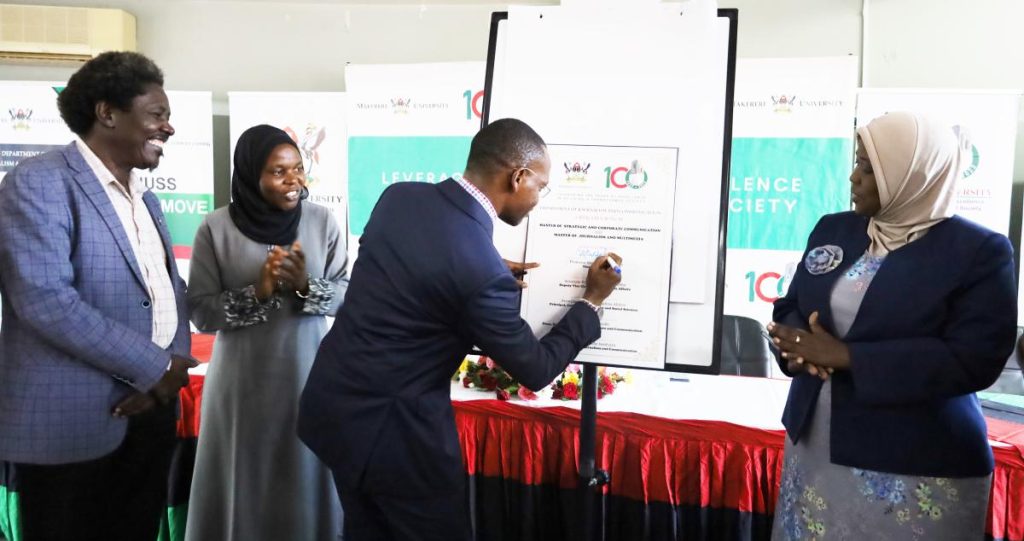
The programme targets practitioners in the areas of journalism and multimedia to enable them acquire advanced knowledge and skills to enhance their practice. It also aims to enlarge the cadre of people with the knowledge and skills to engage in academic inquiry, research and publication in the fast-growing field of journalism and multimedia.
Graduates of the programme will be ready to earn employment in jobs such as: print journalists, online journalists, broadcast journalists for radio and television, media consultants, media policy and regulation consultants, research careers in journalism and multimedia, academic employees, corporate affairs managers, communication officers, media planners, social media content creators and managers among other emerging fields.
The courses on offer include: Digital Journalism and Communication; Business and Financial Journalism; Global Journalism; Communication Graphics; Investigative and Precision Journalism; Media, Governance and Human Rights; Media Economics; Media and Communication Research Methods; Advanced Multimedia Production; Information, Communication and Knowledge Management; Media and Communication Theory; Media Policy and Institutions.
You may like
-


Mak News Magazine: February 2026
-


Over 9,200 to graduate at Makerere University’s 76th Graduation
-


76th Graduation Highlights
-


Mak Selected to Host Alliance for African Partnership Africa Office
-


Meet Najjuka Whitney, The Girl Who Missed Law and Found Her Voice
-


Mak hosts First African Symposium on Natural Capital Accounting and Climate-Sensitive Macroeconomic Modelling
Humanities & Social Sciences
Meet Najjuka Whitney, The Girl Who Missed Law and Found Her Voice
Published
1 week agoon
February 23, 2026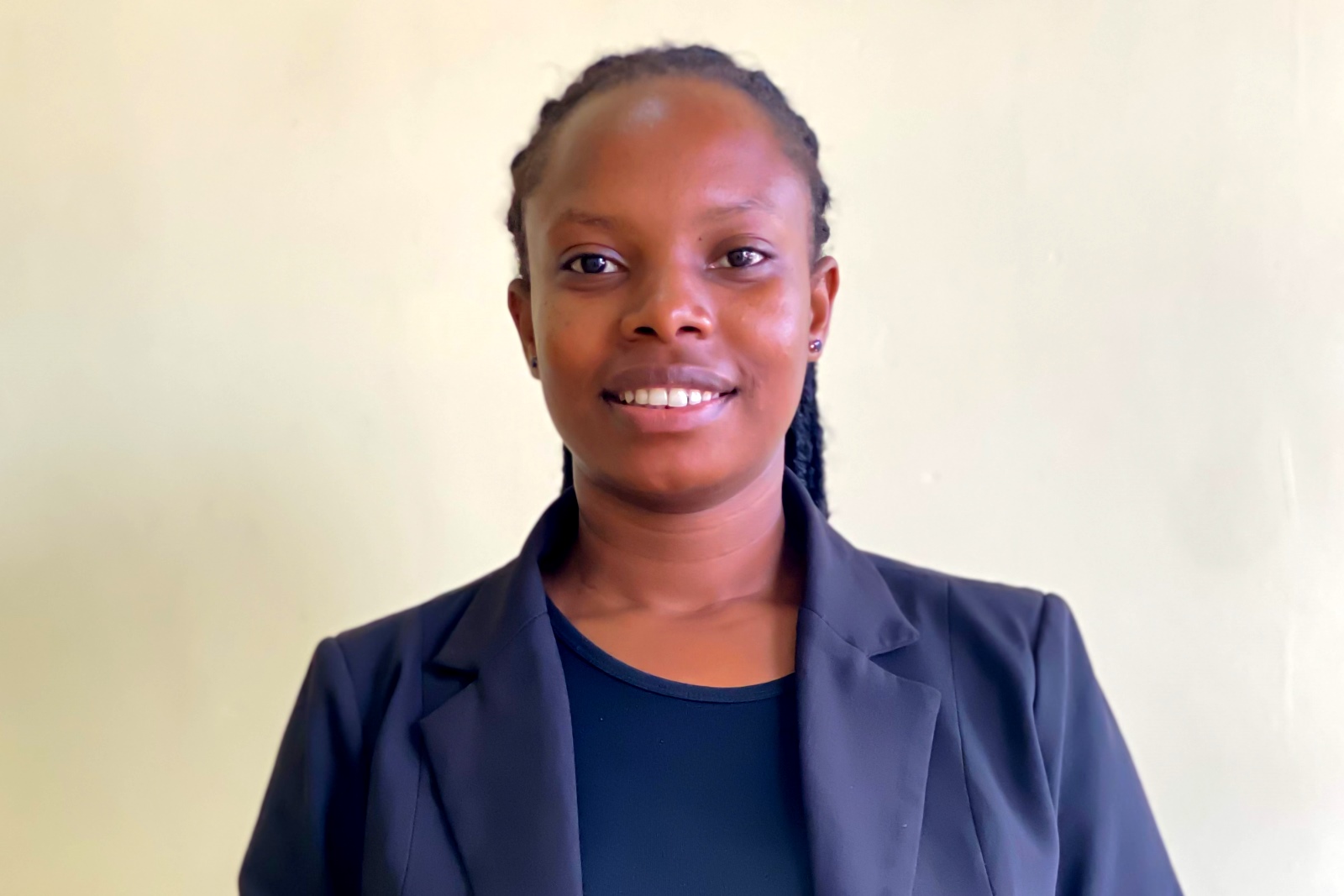
On the morning of Friday, February 27, when the academic procession winds its way across Makerere University’s Freedom Square for the last day of the 76th Graduation Ceremony, Whitney Najjuka will walk into history with a number beside her name: 4.46.
At Makerere, that number means First Class Honours. It means the Vice Chancellor’s List. It means she graduates as the only First-Class student in Journalism and Communication this year. But numbers, as Whitney has learned, rarely tell the full story.
Born on March 27, 2002, in Nabbingo, Kyengera Town Council, to Margaret Kusemererwa and Fred Kasirye, dreamt she would do Law, one of the disciplines, prestigious, almost inevitable next steps for a student who had excelled in secondary school. She had done everything correctly. Studied hard. Scored well. Followed the script.
But Makerere University had other plans. She missed the pre-entry mark, but found her name under Journalism and Communication, another prestigious course offered by the Journalism and Communication Department at Makerere University.
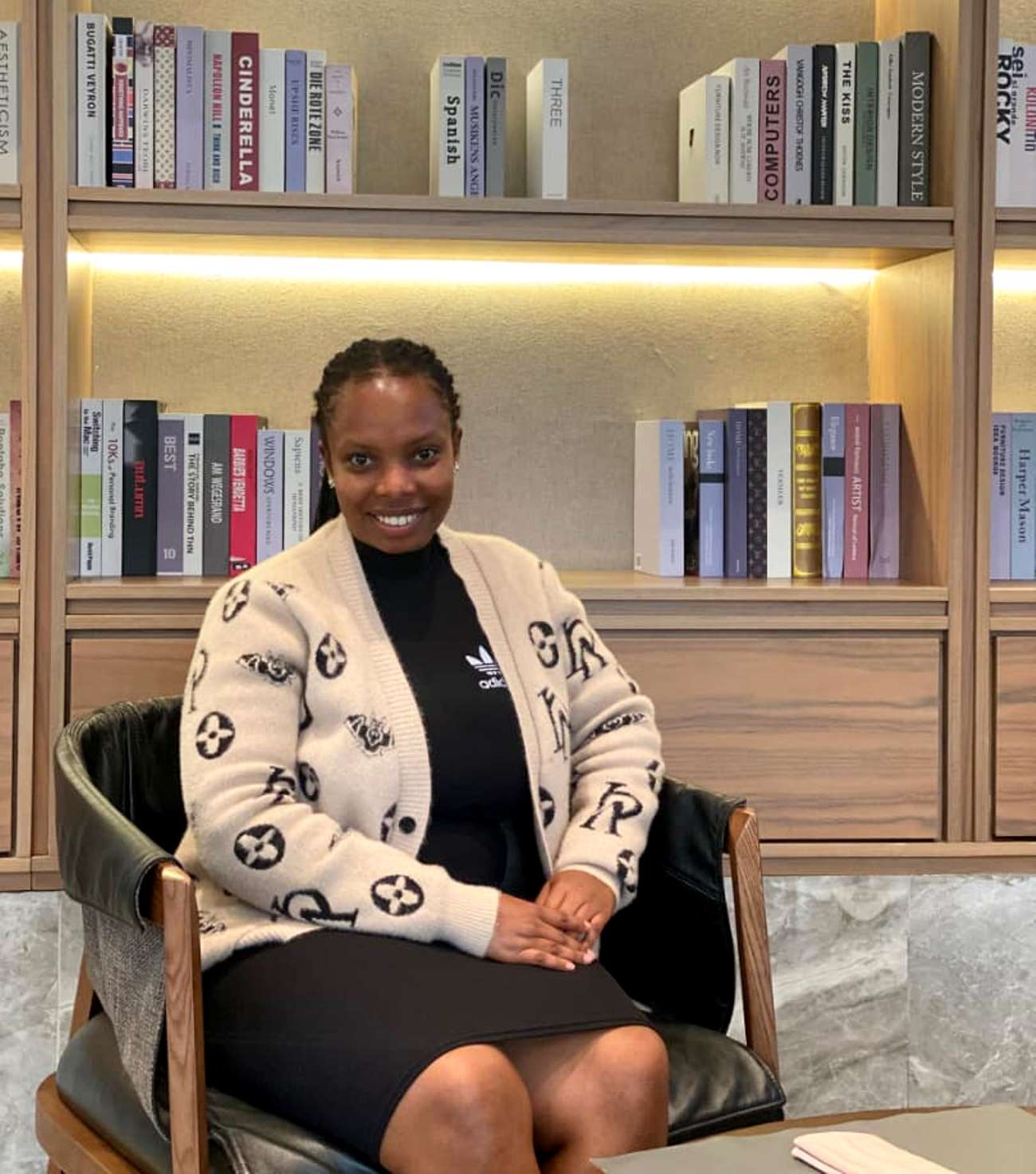
Najjuka began her academic journey at Muto Primary School in Buwama, earning 8 aggregates in the Primary Leaving Examination, a performance that positioned her strongly for secondary school.
She would later join St. Lucia Hill School, Namagoma, where she earned 20 aggregates at O-Level and 17 points in History, Luganda, and Divinity at A-Level.
Missing her dream course, Law, felt at first, like a detour. But Whitney was encouraged by Sanyu Christopher, her uncle, and she settled for a government-sponsored slot in the Bachelor of Journalism and Communication at Makerere, which she had applied for before.
She entered uncertain. But she graduates transformed.
The Pivot That Became a Purpose
Whitney speaks of her early university days with candor. She did not arrive at the Department of Journalism and Communication with a burning childhood ambition to be a journalist, but because another door had closed.
Then, Social and Behavior Change Communication happened. Applied Strategic Communication happened. She began to see media not as headlines and microphones, but as architecture, shaping how societies think, argue, and act.
The turning point came in her third year. The Female Journalist Foundation published her story on Sexual Gender-Based Violence (SGBV) and its emotional toll on survivors. What startled her was not its publication but the reaction. Comments flooded in. Debates ignited, especially about the role of men in combating GBV.
“I realized media doesn’t just report,” she says. “It frames how society views a crisis.”
Her voice, once tentative, had entered a national conversation.
The Discipline Behind 4.46
At Makerere University, a First Class CGPA is not built on brilliance alone but on ritual.
Whitney’s ritual began with showing up, on time, every time. She treated lectures as appointments with her future self. She refused to confine her learning to the syllabus. While attending workshops at the Aga Khan Graduate School of Media and Communication and obtaining external certifications, she sought and was open to mentorship through the Public Relations Association of Uganda (PRAU).
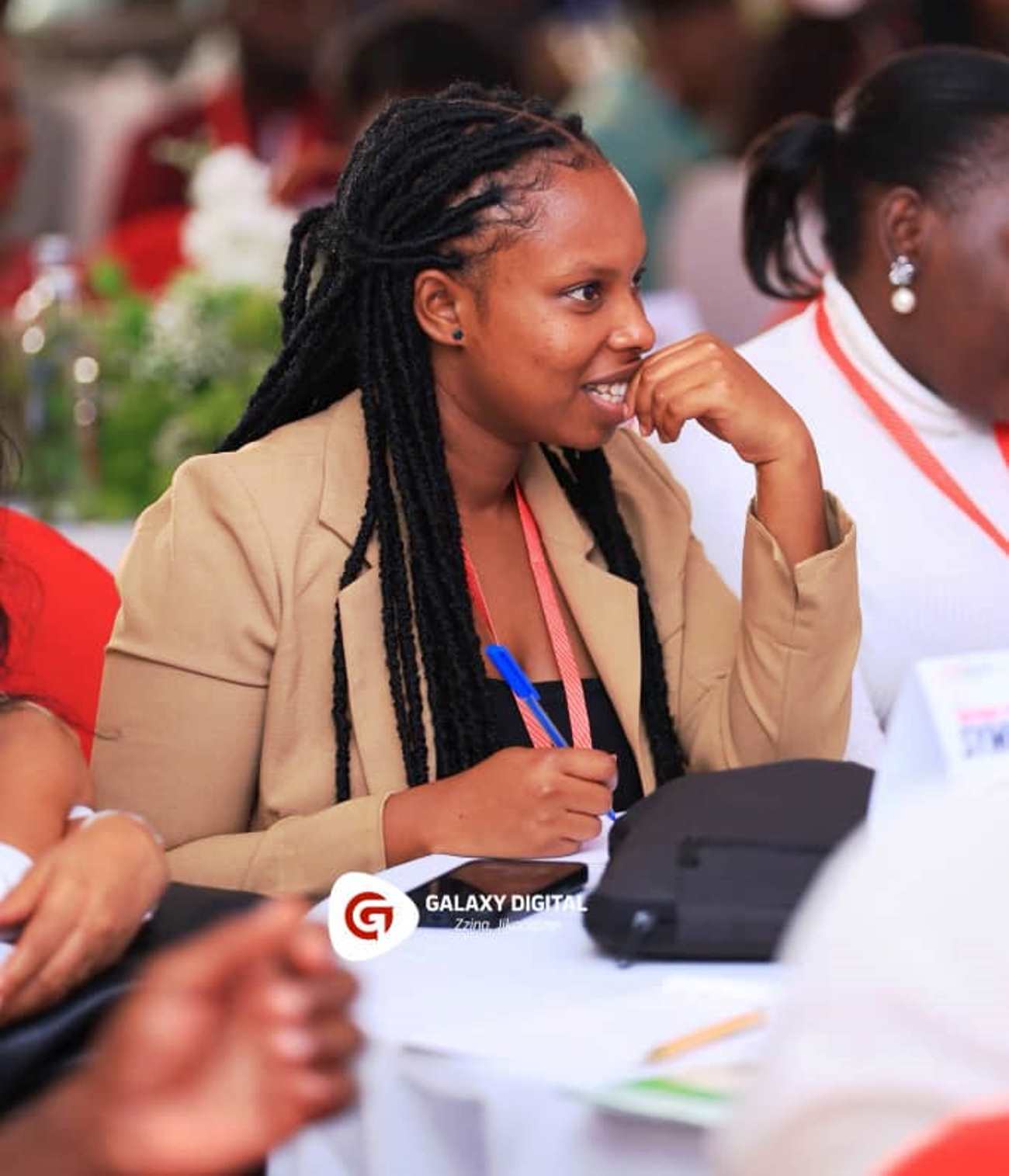
She wanted theory anchored in practice. And then there was the commute.
From Nabbingo, a hill in Wakiso District, some 18.6 km to Kampala, where the Makerere Main campus is situated, and back, nearly 20 hours a week dissolved into Kampala traffic. Two-hour journeys before 8:00 a.m. lectures. Dust. Noise. Headaches. She learned to manage energy the way others manage time. Fatigue became a tutor in resilience.
“I had to be intentional with every remaining hour,” she says. “Excuses were not an option.”
Learning to Practice Communication
If classrooms taught her analysis, presentations taught her courage. Pitching projects, defending research, and standing before peers quick to critique forced her to think on her feet. She was no longer simply studying communication; she was practicing it.
In 2024, the AGMES Fellowship at the Aga Khan Graduate School of Media and Communication pushed her further. She received funding to produce a capstone project on the mental impact of gender-based violence on survivors. She identified sources, conducted interviews, handled trauma with care, and worked with professional editors.
The Communication, she learned, is logistics and ethics as much as eloquence.
The Future She Sees
Whitney is optimistic about Uganda’s media landscape. The digital shift, she believes, has democratized influence. Young communicators are no longer confined to legacy newsrooms or offices.
Yet she sees a gap in the absence of structured research on sustainable, ethical, profitable independent media ventures in Uganda. Her ambition is not only to practice communication, but to study it. To produce data-backed frameworks that help young Ugandans transition from graduates to media entrepreneurs.
She wants to make the impact scalable.
What Remains
As the only First-Class graduate in her cohort, she is careful not to mythologize herself. “Success isn’t brilliance alone,” she says. “It’s a daily commitment when nobody is watching.”
Even before graduation, Whitney had stepped into the industry through a mentorship internship at Capital One Group (COG EA Ltd), a strategic marketing communications agency operating across East Africa.
At Capital One Group, we spoke to Paul Mwirigi Muriungi, the Managing Director and Head of Strategy, who spoke of Najjuka as a progressive and intentional young professional who approaches her work with curiosity, maturity, and responsibility.
“Her attitude is exemplary. She is teachable, receptive to feedback, and eager to grow. While technical skills can be taught, character, work ethic, and mindset determine long-term success, qualities that Whitney consistently demonstrates. Given her academic excellence and professional application, we believe she has a bright future both at Capital One Group and within the wider communications industry. She represents the kind of talent the profession needs: thoughtful, adaptable, and committed to excellence.
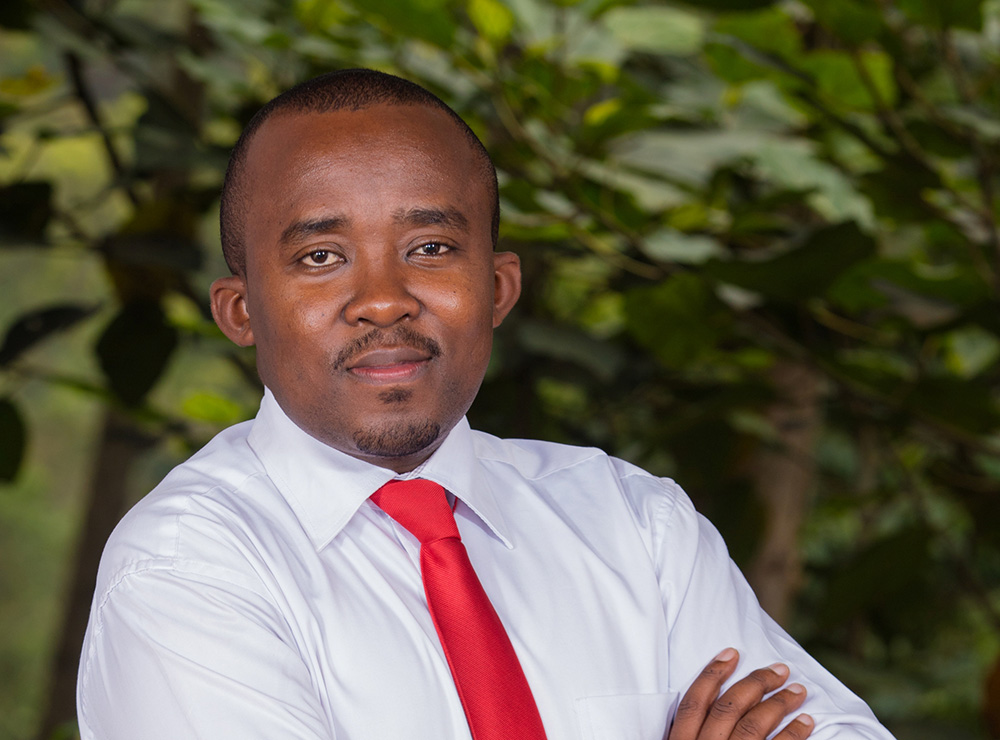
“We look forward to seeing her next chapter unfold,” says Mwirigi.
Najjuka’s gaze extends beyond her own trajectory. She speaks of what the Department could become. Furnished and equipped with industry-standard equipment, newsroom simulations, and deeper investment in data journalism as prayers. Her excellence is not self-congratulatory, but it is forward-looking.
“The University should support the Department to procure industry-standard equipment. Access to high-quality cameras, sound booths, and updated editing software like Adobe Creative Suite is critical to our learning environment,” she says.
Adding that, “We need a newsroom simulation, a physical or digital space where students work under real-time deadlines to produce content for the public. That would prepare us for industry and even strengthen the University’s own media platforms.”
In an era defined by metrics, algorithms, and digital traceability, data journalism is no longer a niche skill but a sine qua non of credible reporting. “There should also be more focus on data journalism and search engine optimization. These are no longer optional skills. Students would benefit immensely from stronger training in these areas.”
Dr. Aisha Nakiwala, the Head, Department of Journalism and Communication, says the faculty are very proud that she is graduating with a First Class—the only one in this year’s cohort.
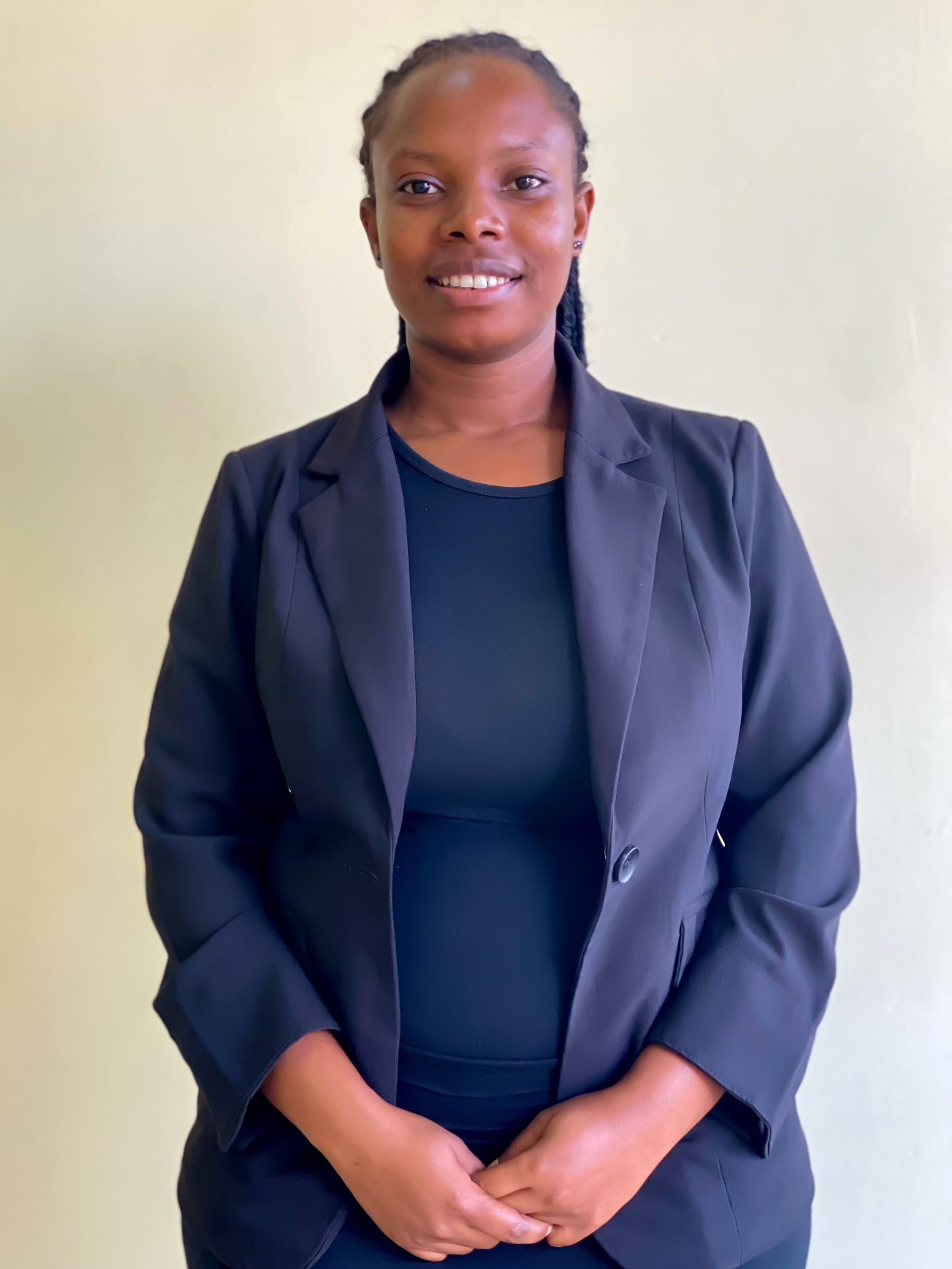
“This achievement reflects not only exceptional intellectual ability but also discipline, resilience, and sustained dedication to the highest standards over four years. Graduating with first-class honors is no small feat; it requires consistent outstanding performance.
“Her accomplishment sets a powerful example for continuing students and reaffirms our department’s commitment to nurturing excellence. We are confident she will make meaningful contributions to the communication profession and society at large,” says Dr. Nakiwala.
On graduation day, applause will crest and recede. The gowns will fold back into wardrobes. The transcripts will be filed away in cabinets. But something quieter will endure; a young woman from Nabbingo who once missed her Law mark, who spent 20 hours a week on the road, who discovered that storytelling is power, and who now walks into Freedom Square not by accident, but by intention.
Life, as she has come to understand it, lives on.
Humanities & Social Sciences
Dr. Pamela Khanakwa Honored for Steering Record 18 PhD Candidates for the Mak 2026 Graduation
Published
1 month agoon
January 23, 2026By
Jane Anyango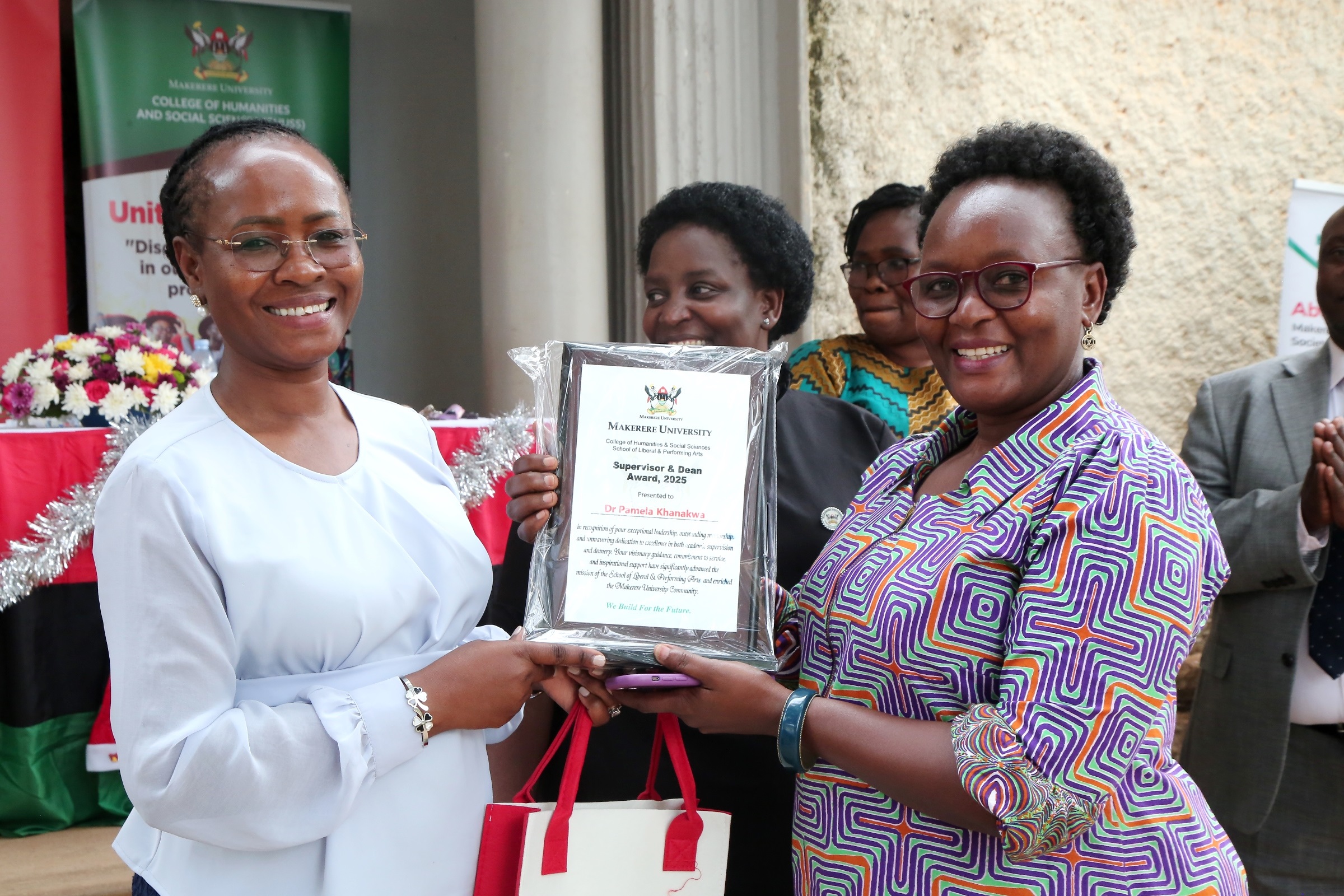
Six personally supervised, three completed in record time, as School of Liberal and Performing Arts sets a historic milestone. Dr. Pamela Khanakwa got the Award as Best PhD Supervisor and Dean
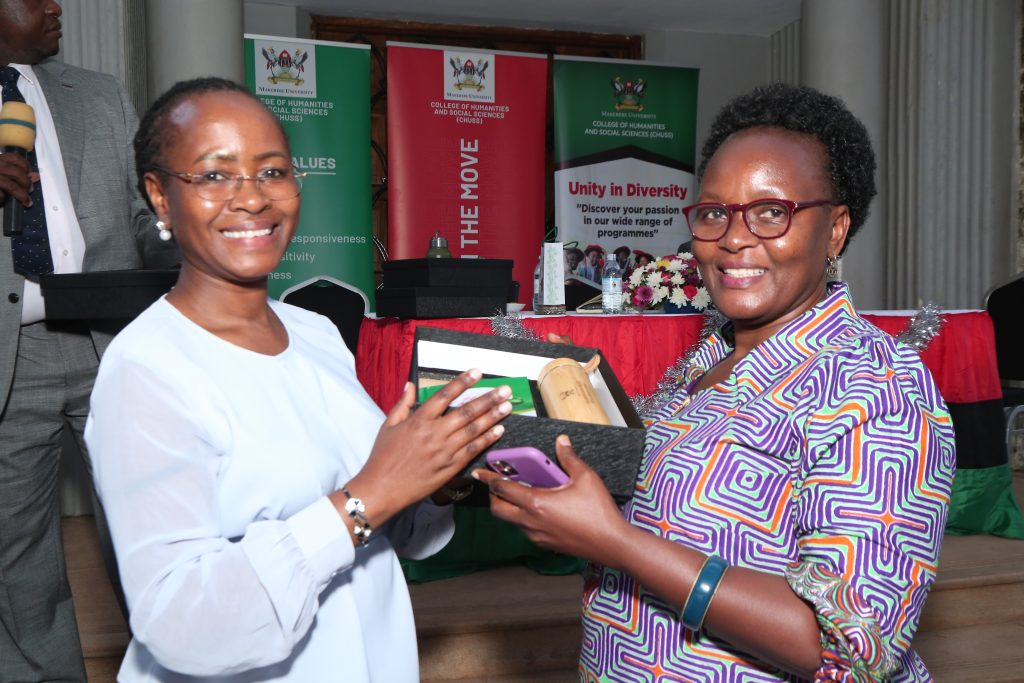
A Historic Academic Milestone for SLPA
The College of Humanities and Social Sciences (CHUSS) recognised the Dean of the School of Liberal and Performing Arts (SLPA), Dr. Pamela Khanakwa, for outstanding academic leadership that has seen the School field 18 PhD candidates for the next 2026 Makerere University Graduation Ceremony scheduled for 24th-27th February. Remarkably, six of these doctoral graduates were directly supervised by Dr. Khanakwa, with three completing within the official three-year timeframe, an exceptional achievement in graduate training. The recognition was announced during the CHUSS End-of-Year Get-Together, where staff applauded Dr. Khanakwa’s dedication, humility, and relentless commitment to postgraduate supervision and timely completion.
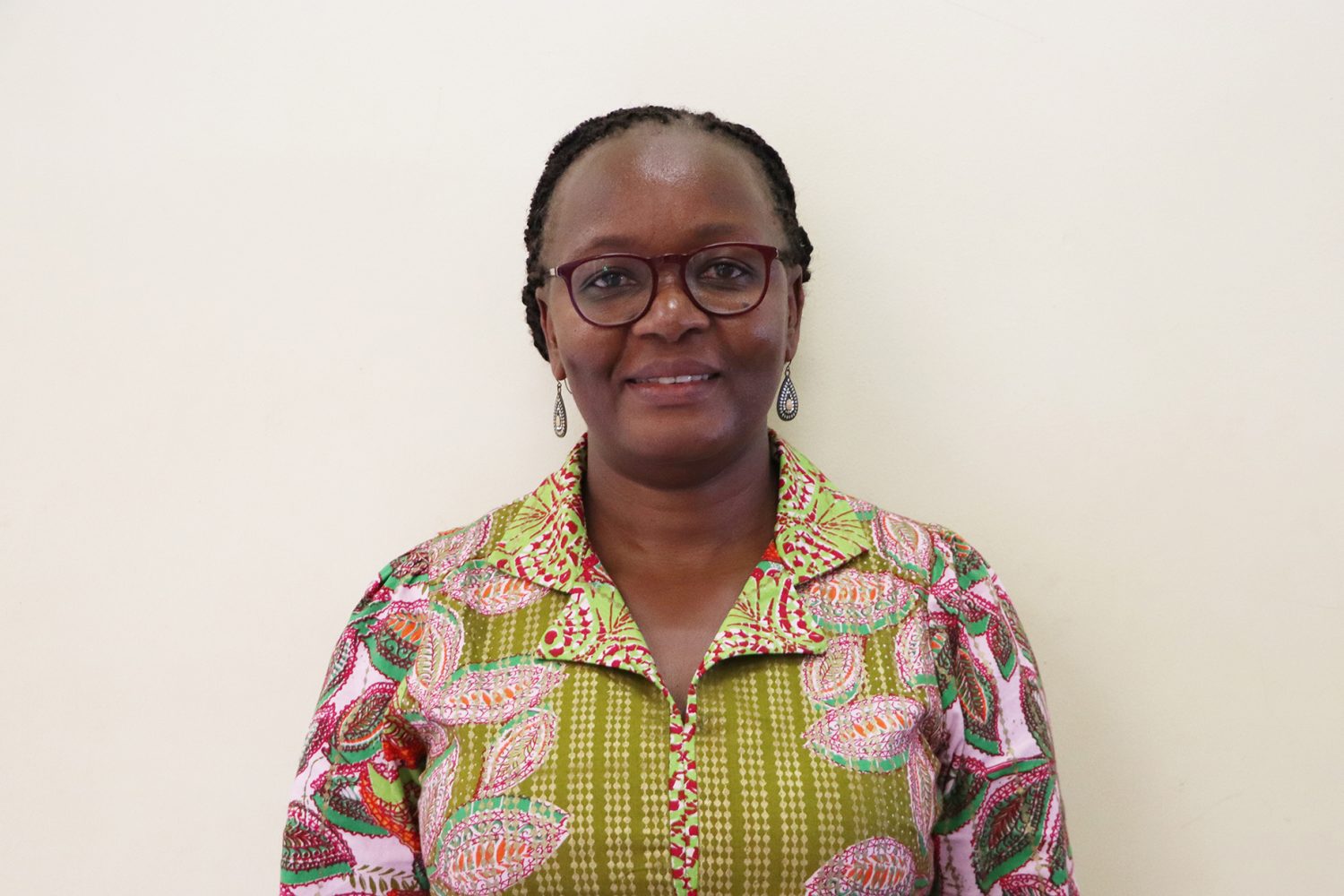
Message to Academic Staff
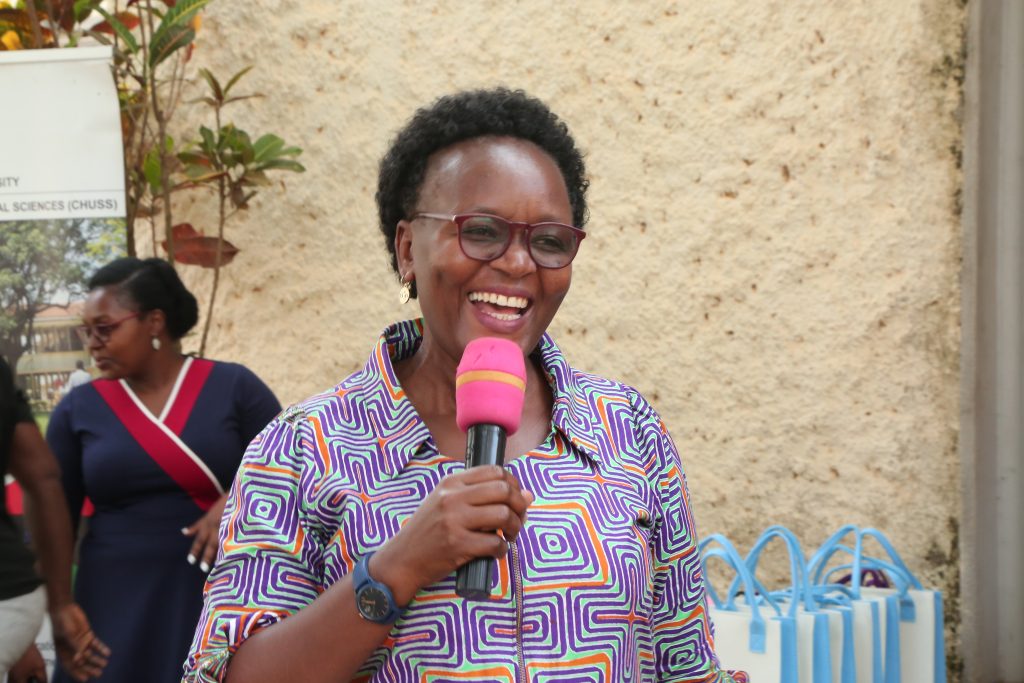
Q: What message do you have for your staff following this achievement?
Dr. Khanakwa:
First, I celebrate my staff and thank them for their dedication to supervision and student support. Academic work is demanding, and material rewards are often limited, but the true satisfaction comes from seeing students succeed.
I encourage my colleagues to remain committed. Yes, the workload is heavy, but many things are possible with dedication and teamwork. Let us continue working for the good of our students, our School, and Makerere University.
Leadership Rooted in Humility
Q: Many colleagues describe you as humble, down to earth, and hardworking. What shapes this character?
Dr. Khanakwa:
I think it is largely my upbringing. My mother was a primary school teacher from the 1950s until the mid-1980s. She worked extremely hard to raise us, combining teaching with farming to ensure we had school fees and basic needs. From her, I learned humility, discipline, and the value of hard work.
I also learned that leadership positions are temporary. You occupy them today, and tomorrow you move on. So humility is essential.
My graduate training also shaped me significantly. My PhD supervisor emphasized that graduate study is a full-time job and that results matter more than noise. Let people see your work through outcomes, not announcements.
Supervision as a Two-Way Commitment
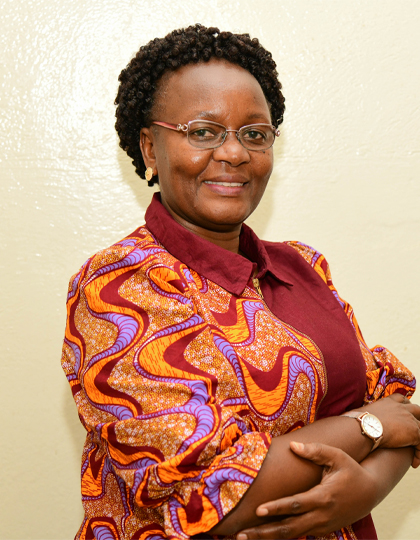
Q: How would you describe your supervision style?
Dr. Khanakwa:
I read my students’ work thoroughly, word by word. Sometimes my comments are tough, but they are honest. Supervision is a two-way commitment. I give feedback, but students must also respond and remain engaged. When that relationship works, progress happens.
Balancing Leadership, Scholarship, and Family
Q: How do you balance being a Dean, scholar, wife, mother, and daughter?
Dr. Khanakwa:
Honestly, I am not sure I balance perfectly. My mother lives far away in Bukwo, so visiting requires careful planning. My children grew up understanding the demands of academic life. I pursued my PhD in the United States and spent long periods away, but we adapted as a family.
Work has become part of my lifestyle. I use weekends to read dissertations, review manuscripts, and write. Sometimes my children ask if I ever sit without working, but this is the commitment I made. As we often say jokingly, “We humbly applied for the job, so let us do the job.”
Scholarship Beyond Supervision
Dr. Khanakwa is also an active scholar and editor. In the past year alone, she has:
- Edited scholarly volumes on archives, memory, method, and pedagogy
- Published a book with Routledge Companion
- Co-authored journal articles and book chapters with graduating students, including Priscah Asiimwe and Anatoli Lwasa Mpijja
“I feel an obligation to write with students,” she notes. “It takes time, energy, and commitment, but it is part of academic mentorship.”
Who Is Dr. Pamela Khanakwa?
Dr. Pamela Khanakwa is the Dean, School of Liberal and Performing Arts, College of Humanities and Social Sciences, Makerere University. She is a seasoned scholar, supervisor, administrator, and mentor whose leadership continues to redefine graduate training excellence. Details about Dr. Pamela Khanakwa can be accessed at: https://chuss.mak.ac.ug/en/personnel/pamela-khanakwa/
More details are available in her attached curriculum vitae.
The CHUSS End- Of-Year-Get-Together
On 12th December, 2025 the college leadership organised a get-together end of year gathering to take stock of the achievements, challenges and brainstorm together on how to move forward. The event was marked by entertainment, team building games, appreciation speeches, sharing a meal and a Christmas package for every staff
Retirees and staff recognised
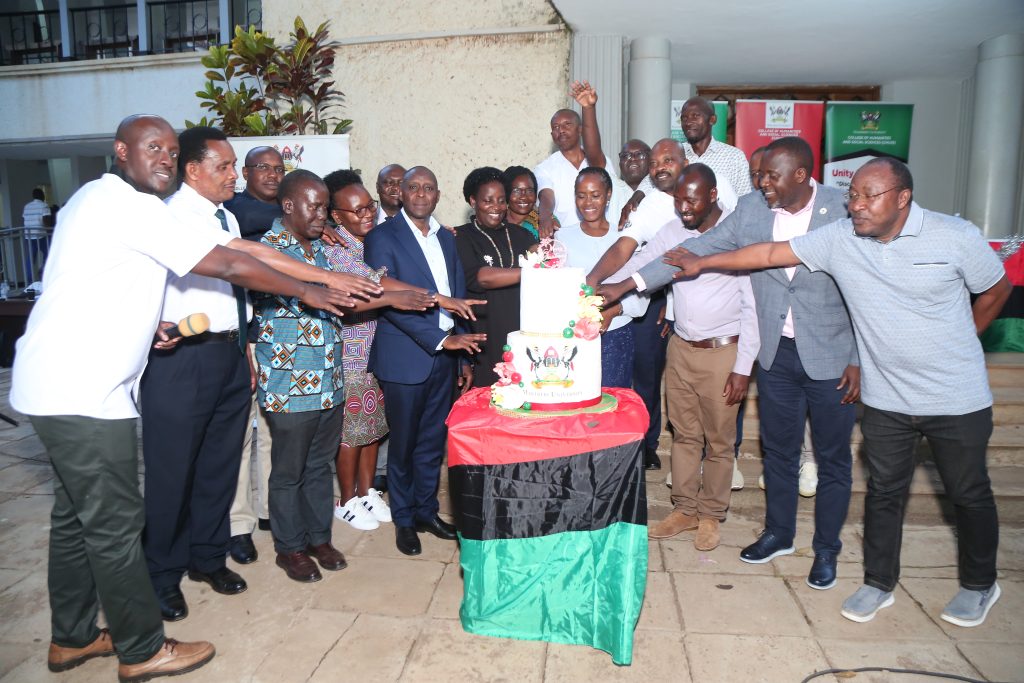
Five retired staff Dr. Micheal Wangotta Masakala, Dr. Anatole Kirigwajjo and Dr. Jackson Kizza Mukas (all from the School of Languages, Literature and Communication), Assoc. Prof. Florence Nansubuga (School of Psychology), Dr. Tusabe Gervase (School of Liberal and Perforing Arts) and Ms. Scovia Nganda Sekweyama (secretary from the School of Social Sciences) were recognised for their dedicated services to the university.
In addition to Dr. Pamela Khanakwa’s Award as Best PhD Supervisor and Dean, Ms. Birabwa Florence scooped the award of Best Registrar of the year. Birabwa is the registrar for the School of Liberal and Performing Arts.
Administrative and support staff including Ms. Mary Gyezaho and Annet Kashumbusha(both administrative secretaries in the Principals office), Farouq Lule (IT Officer), Godfrey Kakooza (cleaner), Charles Sebuguzi (driver) and Jane Anyango (Communications officer) were recognise with awards for outstanding service. Dr. Mohamed Mayanja Kajumba was from the School of Pyschology was recognised as the person with an outstanding talent in Handwriting.
The celebrations held in the Arts quadrangle were graced by the Vice Chancellor Academic Affairs Prof. Sarah Ssali and the Deputy Vice Chancellor in charge of Finance and Adminstration Prof. Ireeta Tumps.
Humanities & Social Sciences
Ugandan Journalists Trained on Peace and Gender-Sensitive Reporting Ahead of 2026 Elections
Published
2 months agoon
January 9, 2026By
Jane Anyango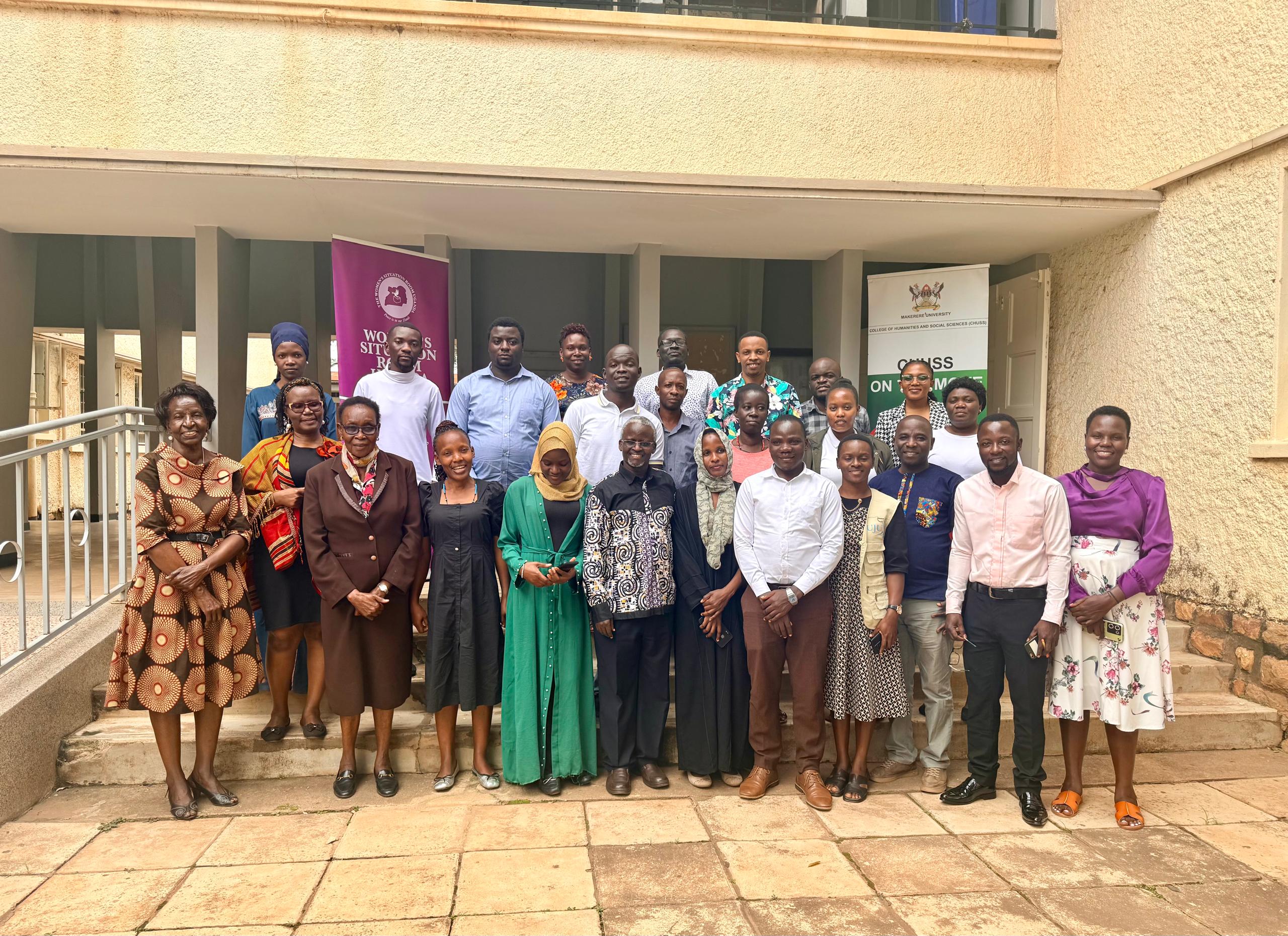
Kampala, Uganda – January 9, 2026
Ahead of the January 15 general elections, Ugandan journalists have undergone specialized training on peace and gender-sensitive reporting to ensure responsible media coverage during the election period. The two-day training, held from 8th to 9th January 2026 at Makerere University’s College of Humanities and Social Sciences Smart Room, was organized by the Women’s Situation Room (WSR) in partnership with various stakeholders and brought together journalists from across print, broadcast, and online platforms.
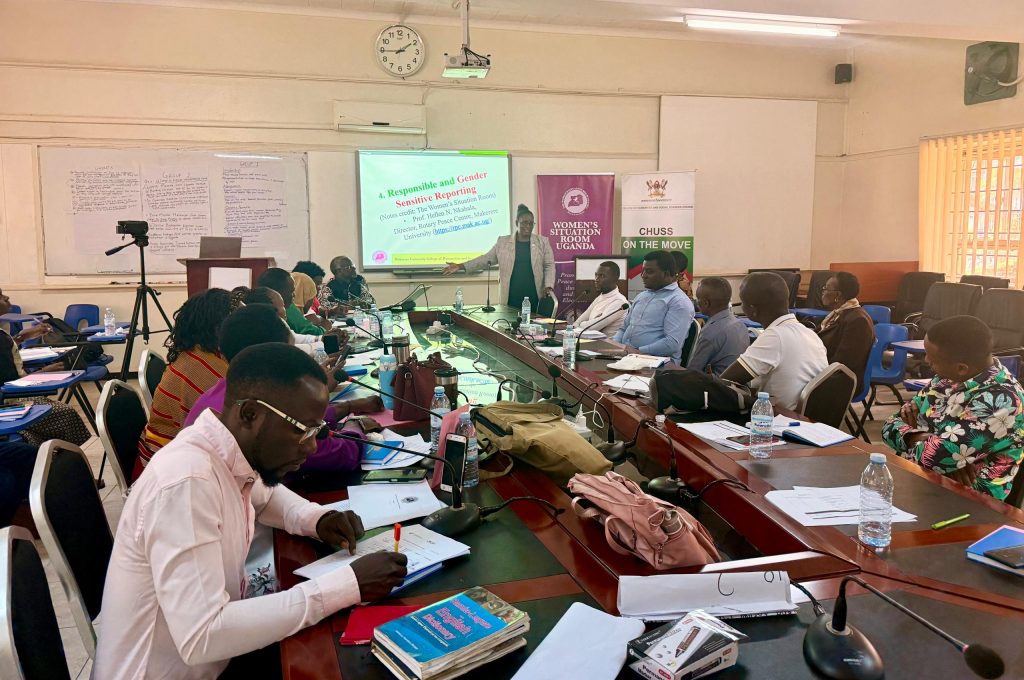
The main objective of the training was to strengthen the capacities of media in reporting and documenting electoral processes in a responsible and gender-sensitive manner. The specific objectives included: strengthening journalists’ skills to cover the 2026 elections in a fair, balanced, gender-sensitive, and non-violent partisan way; enhancing the role of media to enable citizens to be well-informed and actively participate in the election process; ensuring focused and balanced reporting on peace during and after elections; and strengthening partnerships between the WSR and media houses during the election period.
The training covered multiple critical modules. Day one focused on responsible conflict-sensitive reporting, emphasizing principles such as balance, impartiality, and accuracy. Participants explored the role of media as a relayer of the population’s voice, election monitor, catalyst for social cohesion and reconciliation, contributor to the accountability of political actors, and a platform for detecting and debunking digital media misinformation and hate speech.
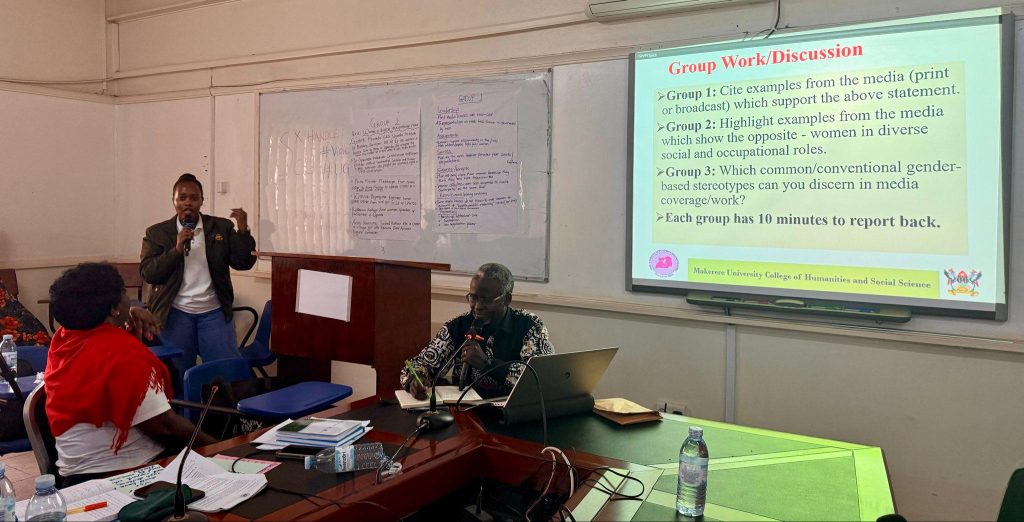
Day two addressed responsible and gender-sensitive reporting. Key aspects included the definition of gender-sensitive reporting, how to become a gender-sensitive reporter, critical elements in reporting with gender awareness, packaging gender-sensitive stories, and a checklist for detecting and avoiding gender-insensitive reporting.
Her Lordship, retired Judge Justice Mary Mayitum, emphasized the importance of peace as the foundation of development and democratic engagement. “Because we value peace more than anything. Without peace, really, you can do nothing. But where there is peace, you can have time to reflect, discuss with others, and join in meaningful dialogue,” she said. She warned that the country’s past conflicts, such as those in Gulu, underscored the necessity of maintaining national harmony.
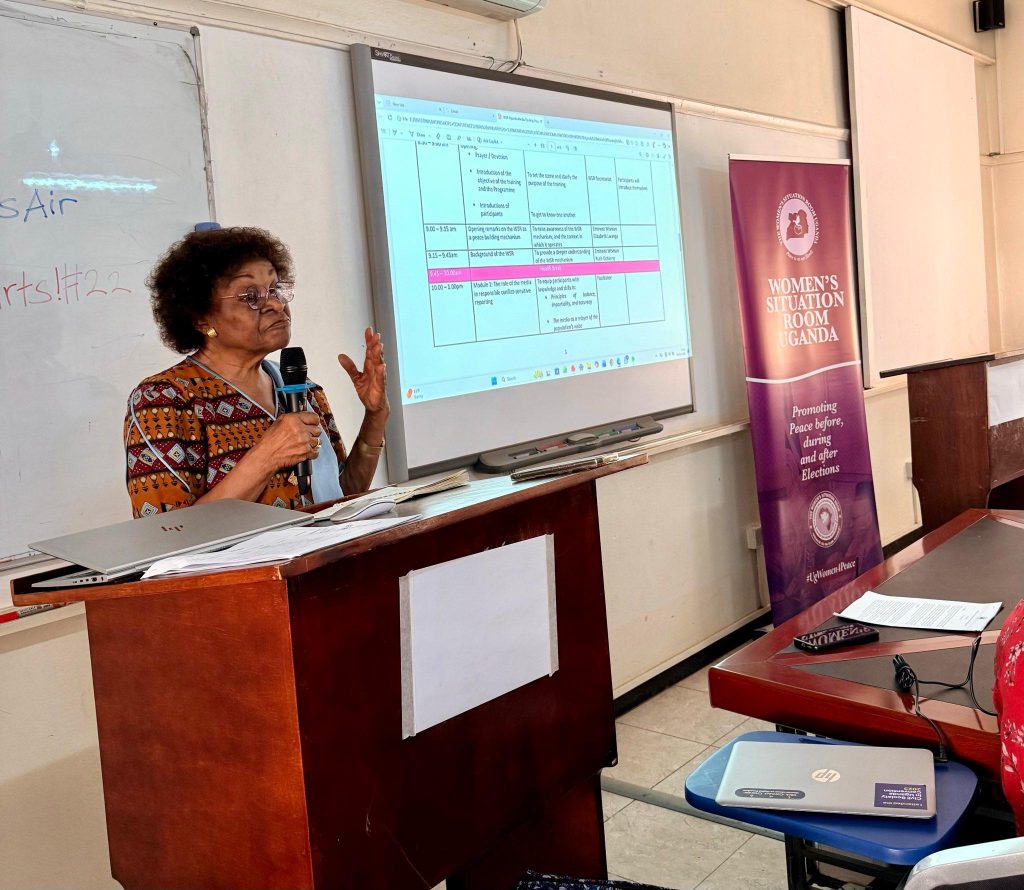
Justice Mayitum also urged other key election stakeholders to uphold peaceful conduct. “Being peaceful is the very heart of life. We have spoken to police, security personnel, political parties, and the Electoral Commission. We want politicians to have a code of conduct and to understand that it’s okay to think differently without fighting or hating one another,” she added.
Dr. William Tayebwa, lead facilitator and senior lecturer in the Department of Journalism and Communication at Makerere University, said, “This training is about conflict-sensitive reporting, peace journalism, and gender-sensitive reporting in the context of the elections. The emphasis was on giving female political candidates a voice while ensuring journalists report responsibly on election-related matters.”
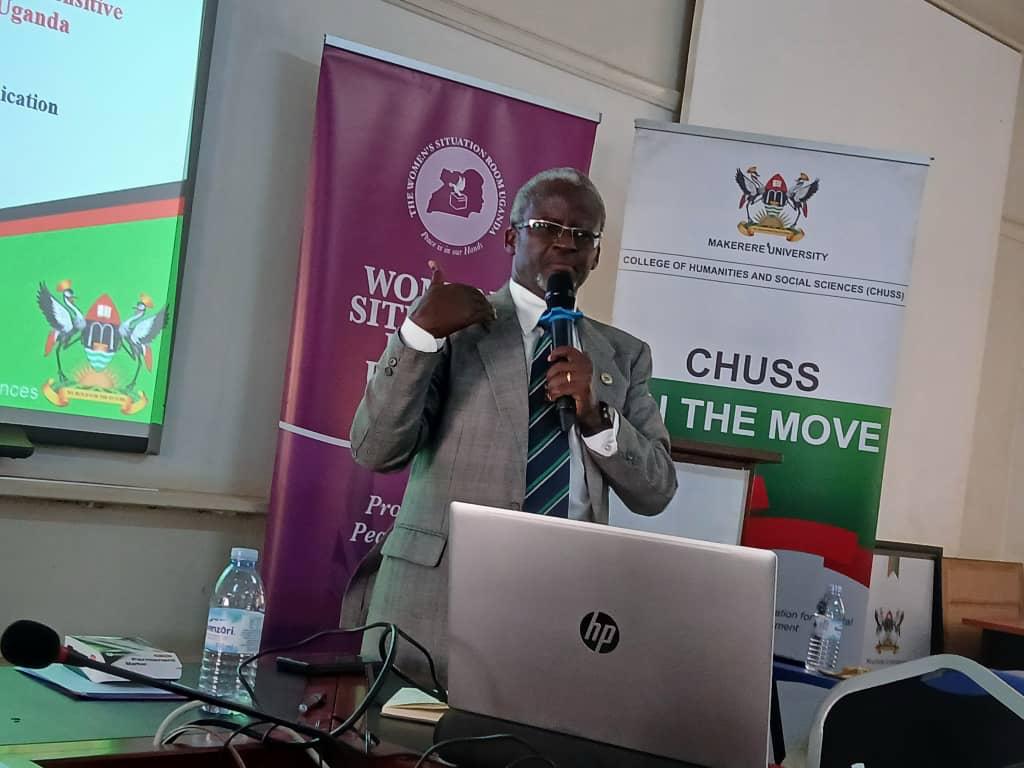
Participants described the training as timely and impactful. Tony Banizengabo of CBS Wakiso District said, “We’ve benefited a lot. We’ve been trained to write stories which bring peace, not conflict. Ahead of the elections, we are very ready to be part of peacemakers.”
Dorcas Kimono of UBC TV Kampala added, “It was so timely and rich. We learned how to report without promoting or fueling violence, giving voice to victims without angering them or encouraging violators. This is very vital, especially as we approach the 2026 elections.”
The training aims to equip media personnel with the knowledge and skills to uphold professional ethics while contributing to a peaceful, inclusive, and gender-sensitive electoral process.
Trending
-

 Humanities & Social Sciences1 week ago
Humanities & Social Sciences1 week agoMeet Najjuka Whitney, The Girl Who Missed Law and Found Her Voice
-

 General1 week ago
General1 week ago76th Graduation Highlights
-

 Health2 weeks ago
Health2 weeks agoUganda has until 2030 to end Open Defecation as Ntaro’s PhD Examines Kabale’s Progress
-

 Agriculture & Environment2 weeks ago
Agriculture & Environment2 weeks agoUganda Martyrs Namugongo Students Turn Organic Waste into Soap in an Innovative School Project on Sustainable Waste Management
-

 General2 weeks ago
General2 weeks agoMastercard Foundation Scholars embrace and honour their rich cultural diversity
